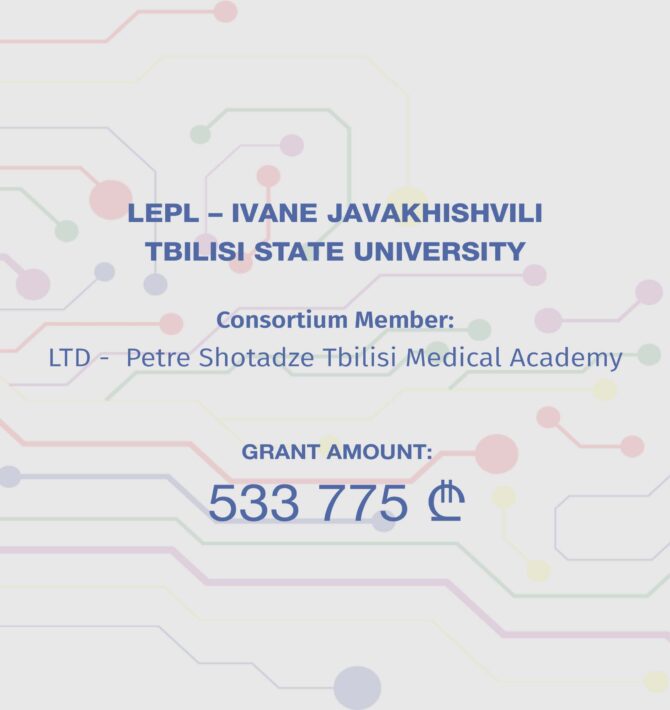Development of a Molecular Pathology Curriculum and Implementation in Georgian Universities in order to Improve Higher Medical Education
Beneficiaries: Ivane Javakhishvili Tbilisi State University and Petre Shotadze Tbilisi Medical Academy
Project Name: Development of a Molecular Pathology Curriculum and Implementation in Georgian Universities in order to Improve Higher Medical Education
Implementation Dates: 07/2024 – 12/2025
Total Project Cost: 551,775.00 GEL
Grant amount: 533,775.00 GEL
Description
The goal of the project is to develop and increase quality of teaching of molecular pathology in Georgia’s higher medical and natural science schools to bring it into line with international standards and the Bologna process.
The mentioned goal will be achieved by performing the following tasks:
- Creation and implementation of an integrated educational course of molecular pathology for first-level medicine, residency, master’s and doctoral students in biology – in cooperation with advanced European educational schools and experts;
- Training of teachers (training of trainers) for the implementation of the molecular pathology course throughout the country (ToT) – both for participating in the consortium and for other authorized universities.
- To create a modernly equipped inter-university teaching-research laboratory (“Hub”) of molecular pathology and a center of bioinformatics for the joint scientific-educational activities of scientists and students.
- With the participation of the universities included in the consortium, the preparation of the interuniversity structural doctoral program of molecular pathology for accreditation, with the assistance of foreign consultants.
With the implementation of the mentioned project, new educational courses (according to different faculties and program levels), a new laboratory, a new teaching method will be created, which will take the development of molecular pathology in Georgia to a new stage
Activities
Within the framework of the project, the syllabus of the molecular pathology training course is being developed (for all levels of education). In addition, a visit of collaborators/experts to Georgia is planned for the purpose of conducting consultations and trainings of project participants. The training of teachers/lecturers of the molecular pathology training course will take place. The evaluation of the quality result of the course will be carried out by the quality services of the Higher Education Institutions, based on which its implementation will take place.
In order to create an interuniversity laboratory of molecular pathology (“Hub”), the equipment and reagents needed for the laboratory will be purchased, the laboratory will be arranged/conducted, the scientific work plan of the laboratory will be developed and the student involvement model in the relevant research will be developed, the laboratory will be included in the educational process.
In order to prepare for the accreditation of the inter-university structured doctoral program “Molecular Pathology”, familiarization with the legal bases and norms will be carried out, the agreement on the peculiarity of awarding the degree to the graduates of the inter-university doctoral program, the identification of the academic staff and infrastructure participating in the doctoral program from each university included in the consortium, the writing of the program and it’s inspection by quality services of universities also will be carried out.
Sustainability
The principal strengths of the presented project includes excellent access to infrastructure (environmental) as well as contextual – educational-scientific sustainability.
Infrastructural sustainability is determined by the new Interuniversity research hub (a modernly equipped teaching and research laboratory) created on the campus of the Institute of Morphology of TSU, equipped with the budget of the project will be a strong base for attracting researchers and research grants, ensures the permanent conduct of research in the direction of molecular pathology, with high impact research output.
Contextual – educational-scientific sustainability is determined by:
- Incorporating the Integrative Molecular Pathology curriculum developed within the grant project into the broader context of “Medicine” educational programs (in Georgian and English languages) – first as an elective course, after that as a mandatory course (during the subsequent accreditation of the mentioned programs).
- The presence of academic staff implementing the mentioned training course (not only in the universities included in the consortium, but also in other universities), who will be trained through the planned trainings (ToT) within the grant.
- Preparation of the interuniversity doctoral program “Molecular Pathology”, which after accreditation will permanently announce the admission of doctoral students who will work in neuroscience under the supervision of Georgian and foreign co-supervisors, including in the above-mentioned laboratory.







